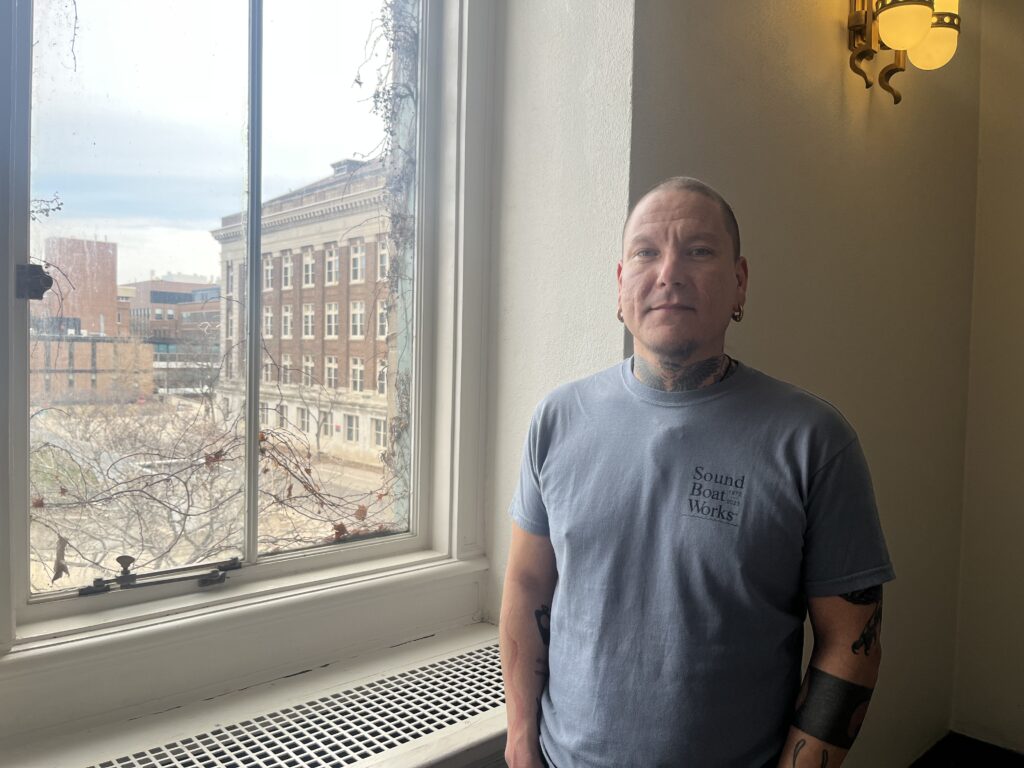Reclaiming the Ojibwe language at the University of Minnesota
First-generation Indigenous graduate student Mskwaankwad Rice is working to preserve his endangered ancestral language.

By Elijah Awada
Even as a child living on a reservation in Canada, Mskwaankwad Rice took note of the waning presence of the Ojibwe language in his community.
“When I was a kid, I recognized that my grandma was the last person who spoke the language, and you look around in the community and only the old people still spoke it,” Rice said. “And I was like, ‘If this continues, the language is going to be gone very soon.’”
Those early observations sparked an interest that eventually ignited a passion and career for Rice, 41, who is now a first-generation Indigenous Ph.D. student at the University of Minnesota Institute of Linguistics specializing in Ojibwemowin, the language of his ancestors.
His goal in pursuing a Ph.D. is not just to improve his career prospects but to reclaim and preserve the language and culture he once saw eroding in his community.
Claire Halpert, director of the linguistics graduate program and Rice’s adviser, said he is one of several Indigenous students who have joined the university’s graduate linguistics programs with the intention to preserve their linguistic heritage.
“In his case, and for a lot of the other indigenous students in our program, they’re very, very goal-oriented. And there’s an extremely strong sense of purpose for what they want to do with language heritage work,” Halpert said. “They’re coming into graduate work as a means to that end.”
In Rice’s case, the preservation task is particularly urgent. Ojibwemowin, one of the terms used to describe the Ojibwe language, is one of the world’s most endangered languages. Only 25,440 people in the United States and Canada still speak it as of 2021, and most of those who know the language well are elders.
“I think that adds to the pressure and that sense of urgency,” Halpert said. “You have to do all these things as efficiently and quickly as possible and there’s no time for missteps and no time to be tired. That can be something that can be really tough to shoulder.”
The path to language reclamation work
Rice is from Wasauksing First Nation, a reservation located near Parry Sound in the Canadian province of Ontario. Throughout his youth, he was only exposed to Ojibwemowin through surface-level lessons at his elementary school and conversations with the elders he encountered.
Rice attended high school in the town neighboring his reservation and went on to receive a bachelor’s degree from a university in Ottawa, Ontario, where he studied Indigenous studies and philosophy. After school, he stayed in Ottawa and worked for the National Association of Friendship Centres, an organization representing Indigenous-owned urban community centers.
In 2012, Rice started taking his language learning more seriously, which brought him back to the reservation. There, he took on a job at the local radio station, “Rez 91,” creating video and on-air lessons for second-language learners of Ojibwemowin.
Through this work, Rice said he found himself becoming increasingly passionate about language reclamation and wanted to deepen his knowledge of Ojibwemowin and related “Algonquian” languages to keep them alive. Graduate school seemed the logical next step, he said.
“I didn’t even really understand what grad school was,” Rice said. “I just heard about it, and it was like, ‘If you want to further your education past undergrad, you’d go to grad school.’”
Navigating a ‘colonizer institution’
Knowing no one with experience in graduate school, Rice researched programs and tackled applications on his own. The University of Minnesota was ultimately the best fit, with its strong linguistics program and relative proximity to his home.
But not everything about the university felt welcoming for an Indigenous student like himself, he said. He was bothered by its history as a land grant university located on stolen Dakota land and the more recent controversy surrounding the university’s possession of the human remains of native people at the Weisman Art Museum.
Despite this tension, Rice found a strong support system in the linguistics graduate program, which has made it a point in recent years to create cultural resources for its Indigenous students. He credits Halpert with giving him the support he needed to move forward in his studies.
“She was super helpful,” Rice said. “Her understanding of what Indigenous students need and what they go through in grad school — that was monumentally huge for my experience. If it wasn’t for her, I don’t know if I would have stuck it out.”
The program’s targeted support has been “attractive to Indigenous students,” Rice said. In the last decade, there has been a 37% increase in Indigenous graduate student enrollments in the College of Liberal Arts, many of whom are in the linguistics graduate program.
Conflicts in the field of linguistics
From the moment he applied to the program, Rice made it clear that he did not want to study linguistics to be a “linguist” in the conventional sense.
“I wanted to study linguistics for how it can help me in my work with language — not to be a linguist,” Rice said. “I’m using it as a tool to help me and help us.”
Among Rice’s goals is to make centuries-worth of documented knowledge about Indigenous languages more accessible to Indigenous second-language learners themselves through education efforts such as language immersion camps, podcasts and YouTube lessons. But to do that properly, Rice needs to think like a linguist.
“Mskwaankwad came into the master’s program without any linguistics background,” Halpert said. “And he, on his own, figured out that he needed linguistics to understand aspects of the grammar of Ojibwe but also to decode the knowledge that linguists had about his language.”
Rice’s graduate education has also revealed harmful assumptions about Ojibwemowin, even within the scholarly linguistic community. Throughout history, he said, white missionary linguists have imposed Eurocentric standards on Indigenous languages, calling them “improper” and the people who spoke them “barbarous.” Such ideas continue to shape the work done today.
In a conference paper published this year, Rice critiqued those assumptions, calling out influential linguists, such as Frederic Baraga, for their flawed methods and motivations. He also prescribed actions to make the field more accessible and just.
The essay has since made waves in the linguistics community and has captured the attention of many tenured linguists, Halpert said.
“As a pretty junior person, he was going to major conferences and presenting this work often to an audience of people who were doing the thing he is critiquing in a very specific way,” Halpert said.
This year, Rice was invited to be on a panel at the Linguistics Society of America, the biggest conference in the field. Halpert said Rice’s essay and the discussion around it set this panel in motion.
“I think it’s a tremendous piece of work and it’s already being cited by prominent people in the field,” Halpert said.
Reclamation work beyond graduate school
Rice expects to complete his dissertation and earn his Ph.D. in Spring 2025.
After he completes his studies, he plans to keep researching complex grammatical structures in Ojibwemowin and find a job that allows him to continue doing documentation work with elders in his community.
“I really enjoy working with the elders. We just have a lot of fun,” Rice said. “So I want to keep doing that. That’s what I want to focus on. Time is of the essence.”

